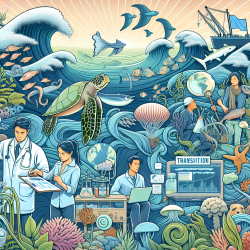Introduction
As a practitioner in the field of environmental management, it's crucial to stay informed about the latest research and trends in sustainable practices. One area that has gained significant attention is sustainable ocean governance. The research article "A Transition to Sustainable Ocean Governance" provides valuable insights into how current economic and social systems can adapt to pressures and shift towards ocean stewardship. In this blog, we'll explore how you can implement these findings to enhance your practice and encourage further research.
Understanding the Need for Change
Human wellbeing is deeply intertwined with the health of our oceans. However, with increasing demands and stressors, the ocean's ecosystems are under threat. The research highlights the necessity for transformative change in ocean governance to maintain the ocean's contributions to people and the planet. By understanding these dynamics, practitioners can better advocate for and implement sustainable practices.
Applying Transition Theory to Ocean Governance
Transition theory, as applied in the research, offers a framework for understanding how systems can evolve in response to external pressures. Practitioners can use this theory to identify niche innovations within their sectors that can be scaled up to drive systemic change. For instance, incorporating renewable energy solutions in coastal communities or promoting sustainable fishing practices can serve as catalysts for broader ocean stewardship initiatives.
Barriers and Pathways Forward
The research identifies several barriers to sustainable ocean governance, including fragmented legal frameworks and the dominance of transnational corporations. However, it also suggests pathways forward, such as fostering polycentric governance systems that involve multiple stakeholders. Practitioners can play a pivotal role in facilitating these collaborations and ensuring that diverse voices are heard in decision-making processes.
Encouraging Further Research
While the research provides a comprehensive overview of the current state of ocean governance, it also highlights areas where further research is needed. Practitioners can contribute to this body of knowledge by conducting case studies, developing new methodologies, and sharing their findings with the broader community. By doing so, they can help shape the future of sustainable ocean governance.
Conclusion
Incorporating the insights from "A Transition to Sustainable Ocean Governance" into your practice can lead to more effective and sustainable outcomes. By understanding the need for change, applying transition theory, overcoming barriers, and encouraging further research, practitioners can make a significant impact on the health of our oceans. To read the original research paper, please follow this link: A transition to sustainable ocean governance.










